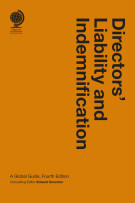
Here’s a book that should be in every chambers’ library, containing as it does, a wealth of informed, authoritative and practical advice in how to run a barristers’ chambers profitably in a fiercely competitive legal environment. So it is not entirely and exclusively about ‘the independent bar’ as such; rather the focus centres on the Bar as a business.
The subtitle contains more a hint about the book’s orientation and content. It asserts, even to the sceptical, that the practice of law is not confined to the law, or knowledge of it. While the law is obviously the most important component in the barrister’s armoury of intellectual weaponry, there is also the requirement of managing a barristers’ chambers as efficiently as possible.
As a former Chairman of the Bar, Chantal-Aimee Doerries remarks in the foreword that the book ‘reflects how much the typical barristers’ chambers has moved into the twenty-first century.’ Referring specifically to the Bar of England and Wales, the book provides insights into what consulting editor David Barnes has categorised as ‘a unique business model’ which ‘enables a diverse mix of specialists to practise as self-employed barristers under the umbrella of a chambers.’
Steeped in heritage and history, the concept of a barrister as a self-employed practitioner is the essence of ‘the independent bar,’ even though there are certain of its members for whom the term ‘business model’ might sit rather uncomfortably. But no matter. This book, a recent publication from Globe Law and Business, provides ample confirmation of the manifold ways in which the Bar of England and Wales has evolved – and will continue to evolve into the digital age and eventually, the new era of artificial intelligence.
The book provides the invaluable insights and advice of no less than fourteen experts from some of legal London’s leading chambers. This is high-level consultancy honed in high-stress chambers environments. In addition to the chapters on strategy, finance and practice management, there are sections on marketing and branding (including best use of social media), recruitment and of course, technology.
Also check out the treatises on wellbeing, risk management and women in law; the latter demonstrating that women have come far in the legal profession in the past twenty years, but not far enough. There is also a useful chapter on developing the business of a chambers internationally.
This is the first book, says Chantal-Aimee Doerries, that addresses the wide range of topics ‘with which any manager of a barristers’ chambers needs to be familiar.’ For barristers -- and certainly their clerks and practice managers -- this practical guide is a stimulating and profitable read.
The publication date is cited as at 2018.
,





